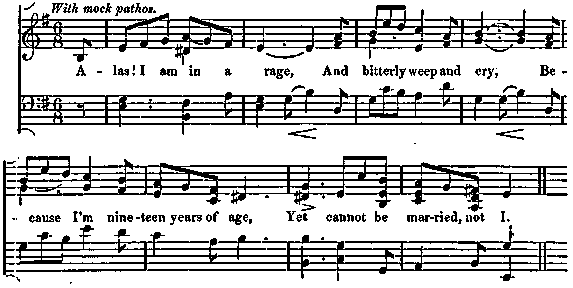Popular Music Of The Olden Time Vol 2
Ancient Songs, Ballads, & Dance Tunes, Sheet Music & Lyrics - online book
| Share page | Visit Us On FB |
|
|
||||
|
REIGN OF CHARLES II. TO WILLIAM III. |
585 |
|||
|
|
||||
 |
||||
|
|
||||
|
Mine eyes do like fountains flow,
As I on my pillow lie, There's none know what I undergo, ' Yet cannot be married, not I. My father is grey and old,
And, surely, ere long will die, And though he'll leave me all his gold,
Yet cannot be married, not I. |
In silks I am still array'd,
And ev'ry new fashion buy, Because I'm so loth to die an old maid,
Yet cannot be married, not I. The gold which I have in store,
I value no more than clay, I'd give it all, and ten times more,
So 1 might be married to-day. |
|||
|
|
||||
|
BARTHOLOMEW FAIR.
" The Countryman's Ramble through Bartholomew Fair" is contained in Vol. I. of Pills to purge Melancholy, 1699 to 1714, and in Vol. III. of the 1719 edition. The tune in The Dancing Master of 1695, and in subsequent editions, also in The Quaker's Opera, and other ballad-operas. In The Dancing Master it is entitled, The Whim, or Bartholomew Fair.
It will be observed that the rhythm is somewhat peculiar, each phrase consisting of three bars. This is one of the forms common to English jigs and hornpipes. Many examples of similar metre might be adduced, but it may be sufficient to cite " A Northern Jigg," on the first page of Apollo's Banquet, 1690 or 1693.
The termination of each phrase with the same note three times, has been considered as a characteristic of Irish music, but there are many old English tunes v.hich share this peculiarity.* I imagine it to have arisen, in both countries, from the music keeping time with the steps of the dance,—
" Why should or you or we so much forget The season in ourselves, as not to make Use of our youth and spirits, to awake The nimble hornpipe, and the tambourine, And mix our songs and dances in the wood."
Ben Jonson's Sad Shepherd. |
||||
|
|
||||
|
" I might quote some of the earliest copies of John, cyme kiss me now, of lam the Duke of Norfolk, and others. 1 he copy of John, come kiss me now that I have chosen, |
is a violin version, and the second note of the three I there taken, usually, the octave lower. |
|||
|
|
||||